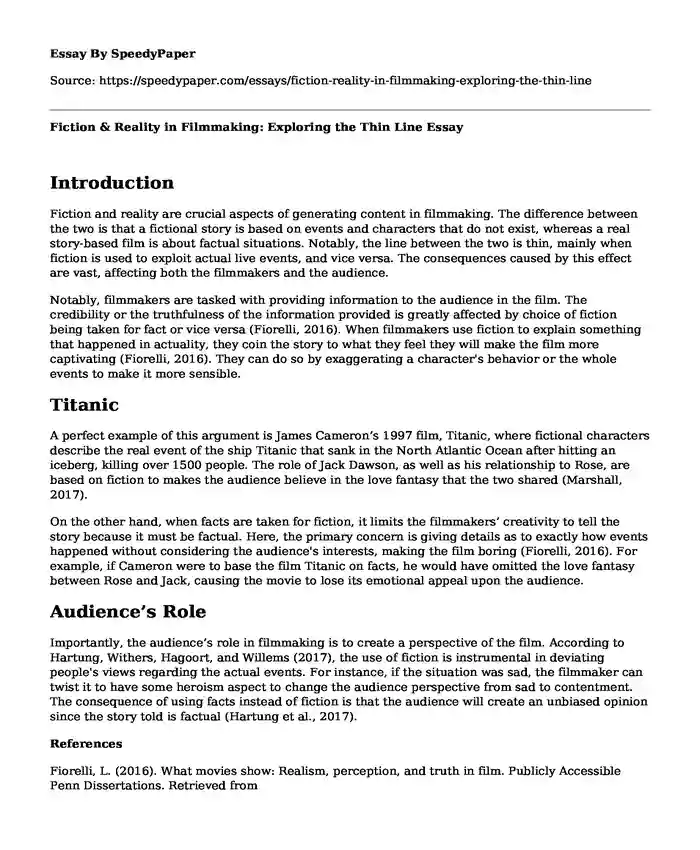
| Type of paper: | Essay |
| Categories: | Movie |
| Pages: | 2 |
| Wordcount: | 502 words |
Introduction
Fiction and reality are crucial aspects of generating content in filmmaking. The difference between the two is that a fictional story is based on events and characters that do not exist, whereas a real story-based film is about factual situations. Notably, the line between the two is thin, mainly when fiction is used to exploit actual live events, and vice versa. The consequences caused by this effect are vast, affecting both the filmmakers and the audience.
Notably, filmmakers are tasked with providing information to the audience in the film. The credibility or the truthfulness of the information provided is greatly affected by choice of fiction being taken for fact or vice versa (Fiorelli, 2016). When filmmakers use fiction to explain something that happened in actuality, they coin the story to what they feel they will make the film more captivating (Fiorelli, 2016). They can do so by exaggerating a character's behavior or the whole events to make it more sensible.
Titanic
A perfect example of this argument is James Cameron’s 1997 film, Titanic, where fictional characters describe the real event of the ship Titanic that sank in the North Atlantic Ocean after hitting an iceberg, killing over 1500 people. The role of Jack Dawson, as well as his relationship to Rose, are based on fiction to makes the audience believe in the love fantasy that the two shared (Marshall, 2017).
On the other hand, when facts are taken for fiction, it limits the filmmakers’ creativity to tell the story because it must be factual. Here, the primary concern is giving details as to exactly how events happened without considering the audience's interests, making the film boring (Fiorelli, 2016). For example, if Cameron were to base the film Titanic on facts, he would have omitted the love fantasy between Rose and Jack, causing the movie to lose its emotional appeal upon the audience.
Audience’s Role
Importantly, the audience’s role in filmmaking is to create a perspective of the film. According to Hartung, Withers, Hagoort, and Willems (2017), the use of fiction is instrumental in deviating people's views regarding the actual events. For instance, if the situation was sad, the filmmaker can twist it to have some heroism aspect to change the audience perspective from sad to contentment. The consequence of using facts instead of fiction is that the audience will create an unbiased opinion since the story told is factual (Hartung et al., 2017).
References
Fiorelli, L. (2016). What movies show: Realism, perception, and truth in film. Publicly Accessible Penn Dissertations. Retrieved from https://repository.upenn.edu/cgi/viewcontent.cgi?article=3501&context=edissertations
Hartung, F., Withers, P., Hagoort, P. & Willems, M. R. (2017). When Fiction Is Just Real as Fact: No Difference in Reading Behavior between Stories Believed to be Based on True or Fictional Events. Frontier Psychology. Retrieved from https://www.frontiersin.org/articles/10.3389/fpsyg.2017.01618/full
Marshall, Sarah. (2017, December 17). The Incredible True Story of How “Titanic” Was Made. Buzz Feed News. Retrieved from https://www.buzzfeednews.com/article/sarahmarshall/20-years-ago-titanic-took-over-the-world-heres-why
Cite this page
Fiction & Reality in Filmmaking: Exploring the Thin Line. (2023, Sep 13). Retrieved from https://speedypaper.net/essays/fiction-reality-in-filmmaking-exploring-the-thin-line
Request Removal
If you are the original author of this essay and no longer wish to have it published on the SpeedyPaper website, please click below to request its removal:
- Free Essay on the Prima Cinema - Investment in the Movie Theatre
- Movie Review Essay Sample: Some Mother's Son
- Celebrities' Bad Influence on Society - Annotated Bibliography Example
- Essay Example: The Positive Impact of Electronic Sports on College Students
- Technology Effect on Discourse, Free Essay
- Essay Sample on the Truth and Uncertainty in the Rashomon Film
- Free Essay on Personal Code of Ethics
Popular categories




